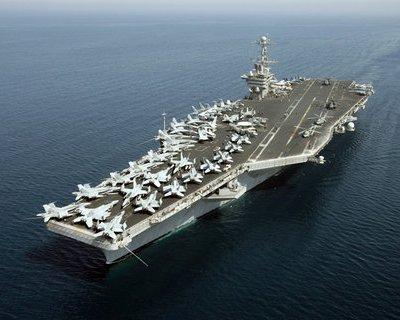Iran warns U.S. not to send aircraft carriers to Persian Gulf; Navy doesn’t back down
The Nimitz-class nuclear-powered supercarrier USS John C. Stennis is seen Friday, May 11, 2007. Stennis sailed out of the Persian Gulf recently and Iran is warning the U.S. not to send it back. (File photo by the White House’s David Bohrer.)
The conflict between the United States and Iran in the Straits of Hormuz ratcheted up a notch over the weekend.
On Saturday, the United States imposed new sanctions on Iran’s Central Bank. Iran fired a short- and medium-range cruise missile into the Persian Gulf, the concluding act of 10 days of naval exercises in the area. A short time later, Iran’s Army chief warned the United States to keep its aircraft carriers out of the gulf — an area where U.S. naval warships often travel. Tuesday morning, U.S. officials said they’d send their ships wherever the want — including into the Persian Gulf.
James Reynolds, correspondent for the BBC, said this probably just amounts to more sabre-rattling on the part of the Iranians.
“I don’t think Iran would want to take on the United States Fifth Fleet in the gulf, in the Straits of Hormuz, where a straight-on confrontation would lead to an Iranian defeat,” Reynolds said. “I don’t think that’s particularly Iran’s strategy.”
The U.S.S. John C. Stennis left the Persian Gulf on Dec. 27 for the Arabian Sea, to support U.S. operations in Afghanistan.
Reynolds said this is, in many ways, probably designed for consumption by Iran’s domestic audience; tough talk to solidify their support for Iran’s leaders. Just last week, Iran’s vice president said that if western powers persisted in levying new sanctions on the country, Iran would close the Straits of Hormuz. A few days later, however, Reynolds said an Iranian military official walked that threat back and said it would not close the strait.
Reynolds said these statements probably confirm that in Iran, there’s a divide among the powerful.
“There is more than one voice coming from the establishment,” he said. “There is a double system. There’s the Supreme Leader, who has control of the armed forces, on one side, and the president and elected officials on the other. You occasionally have to work out conflicting statements between them.”
Both the United States and France in particular have so far shrugged off Iran’s threats. The U.S. on Saturday went forward with his two new threats and France is agitating for greater sanctions from the European Union.
“These military exercises, the firing of pretty short-range missiles and threats which are announced one day and taken back the next day, don’t really do much to change the world’s actions toward Iran,” Reynolds said.
The new U.S. sanctions punish any business or country that does business with Iran’s central bank — a requirement for buying Iranian oil, Reynolds said.
“The sale of oil is how Iran’s government stay in money and power,” Reynolds said.
President Barack Obama has insisted that the world’s oil supplies can stay at the same level with or without Iran’s supply.
